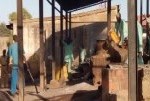Sanitary conditions at the prison premises leave a lot
to be desired. Nothing in the environment meets minimum standard of a prison environment. From open soak-away pits behind the prison cells to the stench of urine and feces around the premises, all known sanitation norms have been disregarded.
The situation is not different at the Goron Dutse Prison, also in Kano City. Existing toilets, drainages and other infrastructure constructed many years ago are begging for renovation after years of overuse and neglect.
These were some of the issues that the Minister of Interior, Gen. Abdulrahman Dambazau was confronted with during an official tour of the two prisons, recently.
Kurmawa Prison was built during the reign of the Kano emir, at the time when emirs served as judges, owned prisons and sentenced law breakers to various prison terms. This explains why many prisons in some northern states are built close to emirs’ palaces.
During the minister’s visit, it was discovered that among the 92 inmates are nursing mothers and their children. The children, though being held for no offense, are still being nursed and have to remain with their mothers who are serving jail terms for various crimes. No fewer than five infants were seen at the prison with their mothers, living in the most deplorable conditions.
Prison authorities told the minister that the offences for which some of the nursing mothers were jailed are those for which they could have been simply cautioned. The prison officials explained that the mothers of the children were either pregnant of already nursing them at the time they were thrown into prison. However, some women who had spent periods longer than the nine months gestation period for a child, some upwards of 18 months, nursing newborn babies.
The obviously perplexed Dambazau who apparently got more than he bargained for, as the decision to check on the female prison inmates was at his instance. He lamented the abuse of the fundamental human rights of the children who were holed up in such deplorable condition for no offense they committed. “The harsh realities in the ancient prisons are too much for any child to bear,” the minister lamented.
One of the female inmates at Kurmawa Prison told the minister that she was thrown in prison alongside her children. She alleged that the children’s offence, according to the authorities, was that they picked money off the ground on her instructions. She said she had been remanded in the prison for four years now, awaiting trial.
Minister of Interior, Gen. Abdulrahman Dambazau said:
I don’t like to see any female inmate with a child because there are a lot of consequences on the child and on the mother. It has been explained to me that while the child is at early age where he is still feeding through the mother, she could still have him until he gets to the point where he can be detached from the mother and be taken to relatives or to the social welfare.
He pointed out that the situation requires serious improvement, which he assured that the federal government would work on.
One of the prison officials who craved anonymity, lamented that incarceration of women alongside their infants was detrimental to the health and psychology of the child, especially taking into cognizance the state of sanitation at the prison. He advocated a review of the law which allows a pregnant woman or nursing mother serving a jail term to keep the baby over a specified period before handing the child for foster care. Observations around the prison environment found it unbefitting for any child to grow in.
There was also the issue of two young persons of Jigawa State, Aminu Yakubu and Mainasara, who were found to have been wrongfully condemned to death for stealing a duck and car stereo and were transferred to Kurmawa Prison without the benefit of a defense. The duo had spent 14 years each, in the prison.
Mainasara cried out to the Minister:
Our prosecution didn’t take place in the open court, to intentionally avoid media attention or justice. Instead of charging us for stealing, we were charged with armed robbery and then condemned to death.
There also was the pathetic story of person of Edo State who had spent 19 years at the prison who had neither been visited by any family member nor had access to a lawyer.
The minister, who after listening to this complaint, asked that a report be written for his attention.
The minister described the issue of awaiting trials as one that remains a major challenge in Nigeria’s prisons, saying his ministry, together with other stakeholders including the police, judges and civil society organizations will come together to find a solution to the nagging problem of inmates awaiting trial, as a way of decongesting the prisons.
He said it was unjust for anyone to spend so many years in prison awaiting trial, noting that some inmates had spent many years awaiting trial for offences for which if they are convicted, they could spend only a few months.
Dambazau said the option of granting amnesty to some awaiting trial inmates whose freedom may not be a threat to the society, would be explored.
He reiterated the federal government’s commitment towards reducing prison congestion, rehabilitating dilapidated prison facilities and above all addressing the issue of awaiting trial, which he said was the main cause of congestion in prisons.










